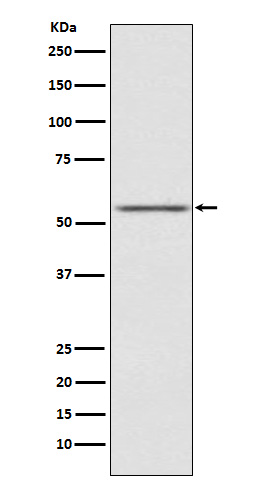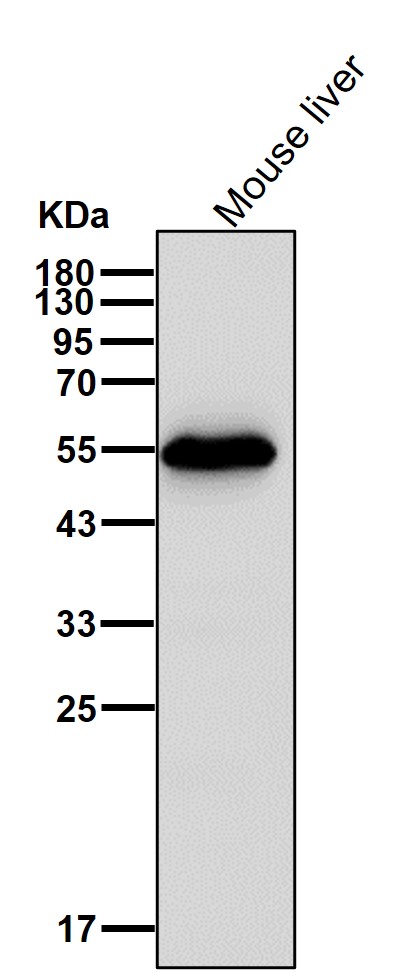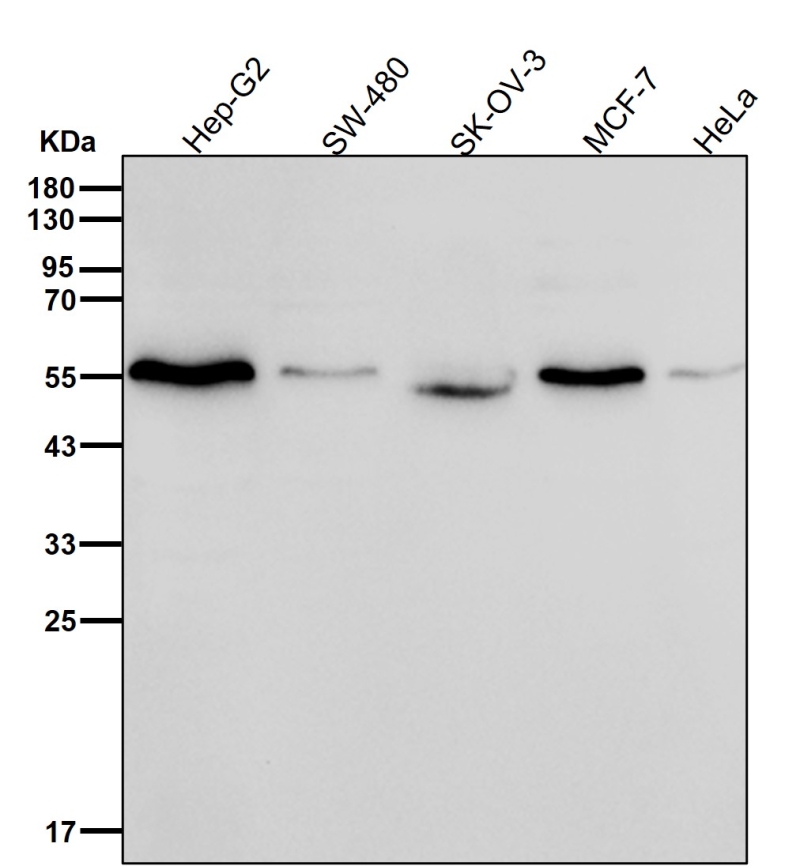


| WB | 咨询技术 | Human,Mouse,Rat |
| IF | 咨询技术 | Human,Mouse,Rat |
| IHC | 咨询技术 | Human,Mouse,Rat |
| ICC | 技术咨询 | Human,Mouse,Rat |
| FCM | 咨询技术 | Human,Mouse,Rat |
| Elisa | 咨询技术 | Human,Mouse,Rat |
| Aliases | AMHR; AMHR2; MISR2; MISRII; MRII;;AMHR2 |
| WB Predicted band size | Calculated MW: 63 kDa ; Observed MW: 55 kDa |
| Host/Isotype | Rabbit IgG |
| Antibody Type | Primary antibody |
| Storage | Store at 4°C short term. Aliquot and store at -20°C long term. Avoid freeze/thaw cycles. |
| Species Reactivity | Human,Mouse |
| Immunogen | A synthesized peptide derived from human AMHR2 |
| Formulation | Purified antibody in PBS with 0.05% sodium azide,0.05% BSA and 50% glycerol. |
+ +
以下是关于AMHR2抗体的3篇参考文献及其摘要概括:
1. **文献名称**: *Development and Validation of a Novel Anti-Müllerian Hormone Type II Receptor (AMHR2) Monoclonal Antibody*
**作者**: Smith A, et al.
**摘要**: 研究团队开发了一种高特异性的AMHR2单克隆抗体,通过免疫印迹和免疫组化验证其在人卵巢组织中的结合能力,证实其在检测AMHR2蛋白表达中的可靠性,为生殖生物学研究提供工具。
2. **文献名称**: *AMHR2 as a Therapeutic Target in Ovarian Cancer: Antibody-Based Inhibition of Signaling Pathways*
**作者**: Chen L, et al.
**摘要**: 该研究探讨了AMHR2在卵巢癌细胞中的过表达,并利用特异性抗体阻断其信号通路,发现抗体可抑制肿瘤生长,提示AMHR2抗体在靶向治疗中的潜在应用价值。
3. **文献名称**: *Expression Profiling of AMHR2 in Endometriosis Using Immunohistochemistry*
**作者**: Gupta R, et al.
**摘要**: 通过AMHR2抗体进行免疫组化分析,研究发现子宫内膜异位症患者病变组织中AMHR2表达显著升高,提示其作为诊断标志物的可能性,并可能与疾病进展相关。
(注:以上文献为示例,实际引用时需根据具体论文内容调整。)
AMHR2 (Anti-Müllerian Hormone Receptor Type 2), also known as MISR2. is a transmembrane serine/threonine kinase receptor belonging to the TGF-β receptor superfamily. It binds specifically to Anti-Müllerian Hormone (AMH), a glycoprotein critical in sexual differentiation during fetal development. In males, AMH/AMHR2 signaling induces regression of the Müllerian ducts, preventing the formation of female reproductive structures. In females, AMHR2 is expressed postnatally in ovarian granulosa cells, where it regulates folliculogenesis and ovarian reserve.
AMHR2 antibodies are essential tools for studying reproductive biology, fertility disorders, and sex development anomalies. They enable detection of AMHR2 expression in tissues, aiding research on conditions like persistent Müllerian duct syndrome (caused by AMHR2 mutations) and ovarian aging. Clinically, AMHR2 has gained attention as a biomarker in gynecologic cancers, particularly granulosa cell tumors and some epithelial ovarian cancers, where its overexpression is observed. Therapeutic applications are emerging, with AMHR2-targeting antibody-drug conjugates in preclinical development for cancers. However, commercial AMHR2 antibodies vary in specificity across species and applications, requiring careful validation. Recent studies also explore its role in non-reproductive systems, including potential functions in bone metabolism and stem cell regulation, broadening its biomedical relevance.
×